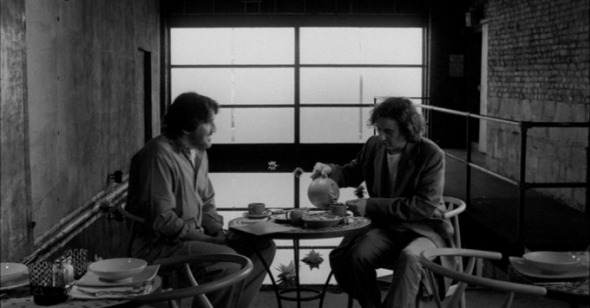Smoke and Mirrors
Elbert Ventura on Coffee and Cigarettes
In his extravagant assessment of Dead Man for the BFI Modern Classics series, Jonathan Rosenbaum writes that his enthusiasm for director Jim Jarmusch in the years preceding that movie had become “somewhat qualified by an overall sense that he was coasting, adopting the role of a sophisticated urban entertainer without significantly expanding his talents or in some cases adequately exploring his territory.” Consider that the epitaph for Coffee and Cigarettes. Made by a director preoccupied with life’s empty minutes, the movie is itself dead time, the nothingness that merely holds achievements past and future in useful context.
Not really terrible as much as inconsequential, Coffee and Cigarettes is so wispy it practically slides off the screen. Only audience good will and Jarmusch’s hipster rep seem to be pinning it up there. Comprised of 11 vignettes connected by the titular motifs, this anthology of bullshit marches out a reliably cool, multi-culti cast, split into discreet duos and trios and shot in lustrous black-and-white. Seemingly improvised banter is shared across a table as Jarmusch urges us to sit back and watch the magic unfold. The alchemical fireworks never do go off, however, a failing confirmed by the smattering of forced titters from isolated pockets in the audience.
The first vignette, starring Roberto Benigni and Steven Wright, each in his respective wired and tired persona, gets things off to a wobbly start. The promise of a combustible mix fizzles early, as the bit strains for eccentricity, in lieu of something to say. Filmed in 1986 for Saturday Night Live, the opening sketch was in fact the genesis for the entire project. In the following years, Jarmusch filmed a short starring Joie and Cinque Lee, Spike’s siblings, and Steve Buscemi, set in a Memphis diner, and another starring Iggy Pop and Tom Waits holding an ugly summit at a California joint. With an eye toward releasing a compendium of the tête-a- têtes, he completed the rest recently, making tenuous thematic connections across the shorts.
The scorecard at the end is unimpressive: six outright duds, three passable bits, and only two successes. The irony is that the best sketches also happen to be the most conventional. In “Cousins,” Cate Blanchett plays herself and her resentful cousin, Shelly, meeting for coffee in a posh hotel lobby. Blanchett’s Cate is regal, classy and generous—the way we imagine Blanchett herself to be. The punky Shelly, meanwhile, exudes passive-aggressive envy, her self-deprecation doubling as a sly prick on the self-conscious Cate’s conscience.
Equally preoccupied with the power disparities immanent in celebrity, “Cousins?” builds on the themes of the Blanchett short. Brit actor Alfred Molina excitedly meets compatriot and rising star Steve Coogan for tea at an L.A. cafe. Molina has big news: an amateur genealogist, he has discovered that he and Steve may in fact be distant relatives. Feigning interest (badly) in Molina and his discovery, Coogan is the quintessential careerist, unable to muster any regard for the eager—and conspicuously less famous—Molina. The longest of the sketches, it also provides the neatest resolution, with a comeuppance that puts the brash up-and-comer in his place.
Featuring celebrities playing “themselves”—one of the movie’s motifs—the two shorts also possess unfashionable virtues: dramatic tension, discernible arcs. Next to the limp doodles surrounding it, they seem like paragons of narrative economy and good acting. Jarmusch tries to spin coherent themes out of his collection, but what we get are half-baked “meditations” on fame, persona, and power. The penultimate entry, “Delirium,” finds Bill Murray playing waiter to RZA and GZA of the Wu-Tang Clan, and begging them, “Don’t tell anyone I’m Bill Murray!” Played strictly for laughs, the sketch underscores the irony of being an actor—of slipping on a mask for a living, and being stuck with your own famous face the rest of the time. Much like the rest of the film, however, “Delirium” dissolves into an indulgent lark, with Jarmusch clearly more interested in letting his stars do their shtick than tackling the stray ideas that arise.
That nonchalance, a defining trait of Jarmusch’s movies, here becomes something more—or, rather, something less. Mistaking lazy for loose-limbed, he displays a strikingly high opinion of the empty minutes that his friends fill. A filmmaker like Abbas Kiarostami shows the passage of time out of respect for human routine and mortality. With its panoply of famous faces, Coffee and Cigarettes nullifies this promise. The kind of movie that gets played at boho parties in Williamsburg lofts, the movie verges on disrespect for the audience, who is expected to happily pay $10 to spend some downtime with these icons of cool.
In its obsession with formal variation, Coffee and Cigarettes is reminiscent of Hal Hartley’s Flirt. Hartley’s experiment used recurring elements to tell the same doomed love story across different contexts. Flawed as it was—and even Hartley knew it, inserting a preemptive critique in the movie itself—Flirt at least used its conceit to express a specific idea: a determinist worldview of modern romance. In Coffee and Cigarettes, the repetition of certain ideas, both visual and thematic, never really coheres into anything novel or interesting. Less virtuoso jazz than indulgent jam, the movie offers a pale imitation of intellectual engagement.
At its best, Coffee and Cigarettes can be a diverting trifle. That’s not so bad if we didn’t expect more, for this is, after all, the work of a filmmaker who made two of the greatest American movies of the last 25 years, Down by Law and Dead Man. (Stranger than Paradise I prefer to think of as merely seminal.) What separates those two from the rest of his oeuvre is the way form and content converge to produce breathtaking and incisive art. His sights set nowhere near that high here, Jarmusch settles for the low-hanging fruit of indie eclecticism. This cliquish throwaway is genial and harmless enough, but you can bet you won’t have as much fun as the people up on the screen.
